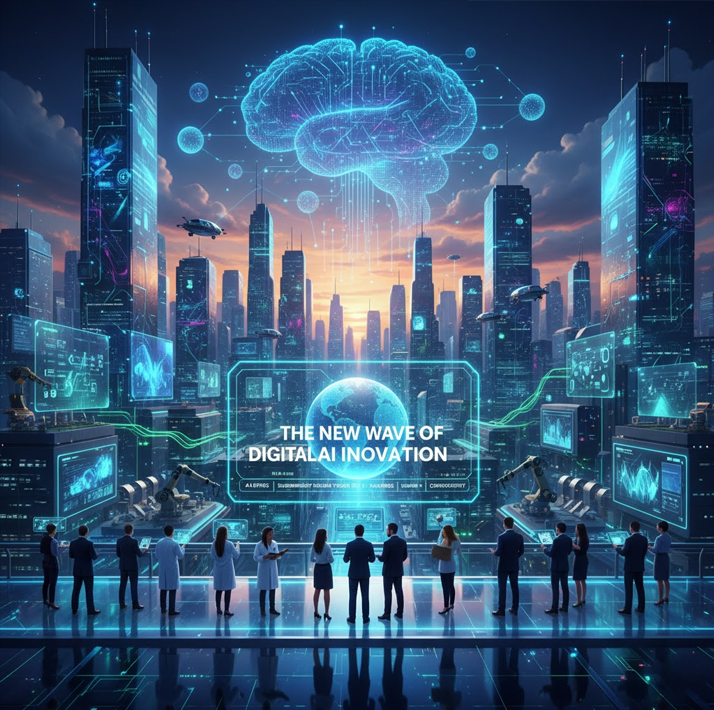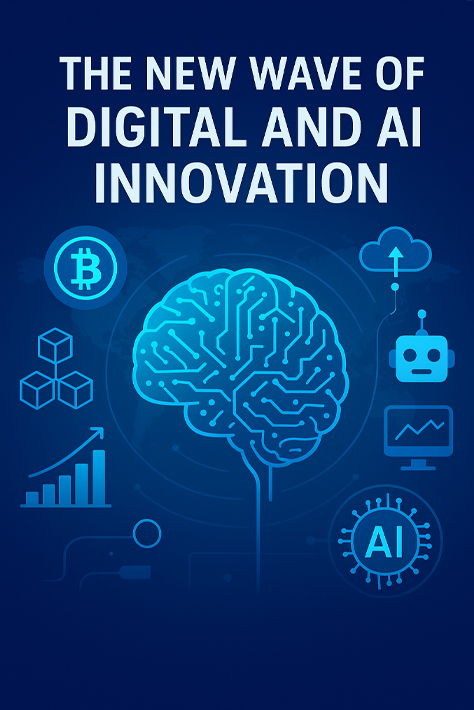Premium Biz Post – In today’s rapidly evolving global economy, The New Wave of Digital and AI Innovation is reshaping every aspect of how businesses operate, connect, and compete. From intelligent automation to blockchain-based trust systems, technology is no longer just a tool—it has become the foundation of strategic advantage. Across industries, companies are racing to integrate artificial intelligence (AI), data-driven analytics, and digital infrastructure to remain relevant in a world defined by constant transformation.

The Acceleration of Digital Transformation
Over the past few years, the digital transformation landscape has accelerated dramatically. The COVID-19 pandemic, for instance, forced enterprises to adopt online operations, cloud services, and remote collaboration tools faster than ever before. Even after the global crisis subsided, momentum continued as organizations refined these digital foundations into interconnected ecosystems that link people, data, and processes seamlessly.
Furthermore, a growing number of CEOs—over 65% according to McKinsey—plan to increase digital transformation investments in 2025. Whether financial institutions leveraging AI to detect fraud or manufacturers deploying predictive analytics to optimize production, the overarching goal remains the same: achieving operational excellence through intelligent automation.
In addition, low-code and no-code platforms have democratized innovation. Today, small and medium-sized enterprises can create applications, automate workflows, and utilize data analytics without deep technical expertise. As a result, competition is evolving rapidly, allowing agile startups to challenge long-established corporations through creativity and speed.
Artificial Intelligence: The Heart of Modern Business
Artificial intelligence is no longer confined to research labs. Instead, it now drives tangible business value. Machine learning (ML), natural language processing (NLP), and generative AI allow organizations to deliver hyper-personalized experiences, streamline logistics, and uncover insights buried in massive datasets.
For instance, AI-powered chatbots and virtual assistants enhance customer engagement while reducing response times. Similarly, predictive algorithms in healthcare support early diagnosis and tailor treatment plans to individual patients. In finance, robo-advisors and automated risk assessments have revolutionized portfolio management. Consequently, AI’s reach continues to expand, bridging the gap between human intuition and machine precision.
Nevertheless, as dependence on AI grows, ethical concerns arise. Governments and organizations worldwide are implementing frameworks to ensure responsible AI deployment, emphasizing fairness, transparency, and privacy. Maintaining human oversight while accelerating innovation will be the defining balance of the coming decade.
Read More : ”Broom Stick Craftsmanship Simplicity That Holds Economic and Artistic Value”
Blockchain and Trust in a Decentralized Era
Although AI captures most of the spotlight, blockchain technology quietly reinforces the backbone of digital trust. Beyond cryptocurrencies, it enables secure, transparent, and traceable data exchange across sectors—from supply chains to healthcare.
For example, companies such as IBM, Maersk, and Walmart have integrated blockchain systems to enhance transparency and reduce fraud. Meanwhile, central banks are exploring digital currencies (CBDCs) to modernize payment systems. Moreover, the synergy between blockchain and AI introduces new possibilities: AI can detect anomalies in blockchain data, while blockchain ensures the integrity of the information AI relies on. Together, these technologies are creating a more secure and intelligent global economy.
The Rise of Smart Infrastructure and IoT
The Internet of Things (IoT) is transforming infrastructure into living, intelligent systems. Smart cities, for instance, use sensors and AI analytics to optimize traffic, reduce energy waste, and enhance public safety. Similarly, IoT in agriculture monitors soil conditions and crop health, enabling farmers to make data-driven decisions that increase yield and sustainability.
In industrial environments, predictive maintenance powered by IoT sensors prevents costly equipment failures. As these connected systems proliferate, our world becomes more efficient yet more vulnerable. Therefore, cybersecurity and encryption have become critical to safeguarding this massive digital network.
Generative AI and the Creative Revolution
Generative AI models such as GPT, DALL·E, and Midjourney are redefining the boundaries of creativity. They can generate text, art, and even code—empowering creators to innovate faster and more effectively. As a result, businesses use generative AI to design marketing materials, develop prototypes, and simulate complex scenarios with minimal manual input.
The entertainment industry, too, is experiencing a transformation. AI-generated films, songs, and interactive content blur the line between human artistry and machine intelligence. However, this advancement raises new questions about authorship, intellectual property, and misinformation. Looking ahead, next-generation AI models will be multimodal, combining vision, sound, and text to understand and create across all sensory channels.
Data: The Fuel of the Digital Age
Every innovation relies on data as its foundation. The explosion of big data has provided organizations with unprecedented insights into consumer behavior, market trends, and operational performance. Yet, having data is not enough—its value depends on how well it is analyzed and applied.
Modern analytics platforms leverage AI to transform unstructured information into actionable insights. Tech giants like Google, Amazon, and Tesla constantly refine algorithms through massive datasets, delivering personalization and precision at scale. However, as data grows in importance, so do privacy concerns. Companies must prioritize cybersecurity, encryption, and ethical data governance to maintain user trust.
Ultimately, in the years ahead, data will not only serve as a business asset but also as the currency powering The New Wave of Digital and AI Innovation across industries.
Sustainability Through Technology
Innovation today must be sustainable. Smart technologies are helping companies minimize waste, optimize resources, and cut carbon emissions. AI-powered models predict climate trends, while blockchain solutions verify carbon credits transparently.
Digital twins in manufacturing identify inefficiencies before production begins, while AI-driven logistics reduce fuel consumption through optimized routing. Even the food and beverage sector is embracing IoT to monitor supply chains and improve sustainability. Collectively, these developments illustrate how technology can align profitability with environmental responsibility.
The Future Workforce: Humans and Machines in Harmony
Automation may handle repetitive work, yet humans remain irreplaceable in roles that demand creativity, empathy, and strategic thinking. Therefore, the future of work will depend on seamless collaboration between people and intelligent systems.
According to the World Economic Forum, over half of the global workforce will need reskilling by 2030. Consequently, companies that invest in continuous learning will gain a distinct advantage. At the same time, remote and hybrid work models—powered by AI-driven collaboration tools—are redefining productivity, flexibility, and access to global talent.
The Business Impact of Digital Convergence
As AI, IoT, blockchain, and analytics converge, a new era of “digital convergence” emerges. Retailers now use AI recommendation engines, while banks adopt blockchain to accelerate transactions. Meanwhile, manufacturing plants increasingly operate through autonomous systems.
Consumers, too, are evolving. They expect instant service, personalized experiences, and transparent brands. To meet these demands, businesses must integrate technology into every process, creating seamless digital-first ecosystems. However, this transformation also calls for thoughtful regulation and ethical leadership to prevent misuse and inequality.
Navigating the Premium Era of Technology
In conclusion, the global economy stands on the edge of its next great leap. The integration of AI, blockchain, IoT, and data is ushering in an era defined by intelligence, connectivity, and opportunity. Companies that embrace innovation with agility, ethics, and vision will not only thrive but also lead the world into a smarter, more sustainable future.
Ultimately, The New Wave of Digital and AI Innovation is about far more than technology—it’s about the human spirit to adapt, create, and build a better tomorrow.



